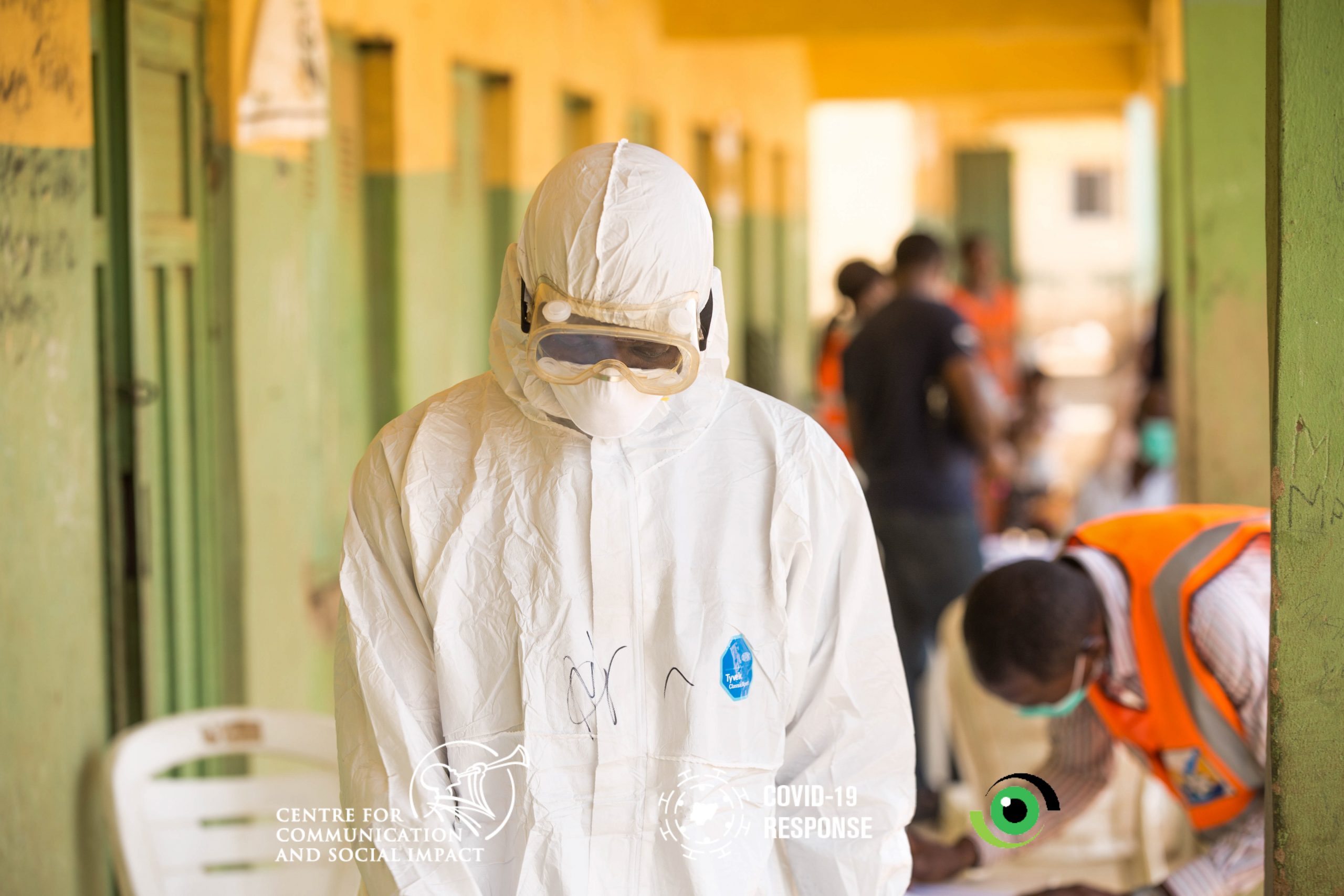The first 90 days: How has Nigeria responded to the COVID-19 outbreak? #COVID19NaijaResponse – Chibuike Alagboso and Bashar Abubakar (Lead Writers)
Nigeria recorded its first COVID-19 case, an Italian national on February 27, 2020. The virus, which originated from Wuhan in China at the end of 2019, has infected over six million people and led to the death of over 300,000 worldwide. Nigeria’s index case was confirmed by the Virology Laboratory of the Lagos University Teaching Hospital, one of the two laboratories with the capacity to diagnose COVID-19 in Nigeria at the time. Even though the index case came to Nigeria through the Murtala Muhammad International Airport Lagos, the fact that he was first suspected to have had the virus in Ogun state meant that all the people who had contact with him — a total of 39 people, including four health workers at his company’s clinic — had to be quarantined by the Ogun State Government, and contact tracing of the people on the same flight with him was initiated by the Lagos State Government and the Nigeria Centre for Disease Control (NCDC).
It took another 11 days for the second case to be confirmed in the country, a contact of the Italian national, on the 9th March 2020. Since then, the number of cases in Nigeria have grown, initially with Lagos being the epicentre of the pandemic in Nigeria. The rising rates of infections in a number of European countries, the high number of COVID-19 cases in China, the epicentre of the virus at the time, and international flights still operating, made Nigeria particularly vulnerable.
Since March 2020, borders have been shut, lockdowns imposed, interstate travel banned, and offices, clubs, and services considered to be non-essential closed. The public sector has also been affected and the low economic activities especially in the oil and gas industry, trade and manufacturing as well as services have significantly impacted government’s revenue, leading the Federal Government to revise the 2020 budget down by more than N71 billion. COVID-19 has undoubtedly affected every aspect of our lives.
From the moment the first case was reported in Nigeria, the Nigerian government and its different agencies initiated several health, economic, security and social responses to contain the disease and its impact on society. One major response is the government-funded N500 billion COVID-19 crisis intervention fund, and enhanced support to states for critical healthcare expenses.
Responding to the outbreak has required the involvement of multiple government institutions and development partners. Highlighted below are some of the key measures Nigeria put in place to respond to the pandemic, in the first 90 days since the first confirmed case was identified.
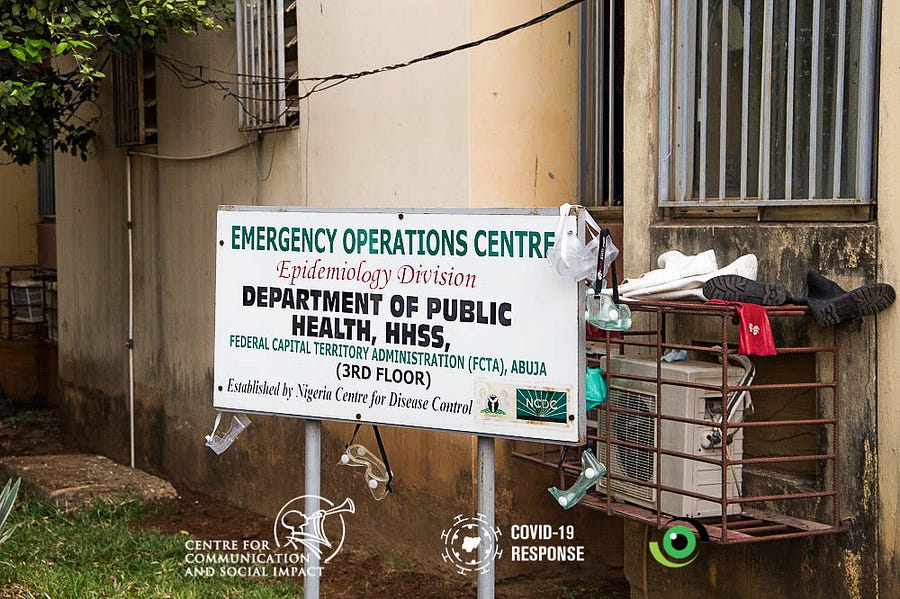
Setting up the Presidential Task Force: The Federal Government of Nigeria
The Nigerian Presidency provides leadership for policy direction and activities of the various Ministries, Departments and Agencies (MDAs). With the COVID-19 outbreak, the full machinery of the presidency was deployed in response to the outbreak. The president first banned flights from countries with high rates ongoing transmission of COVID-19 on March 18, 2020, and five days later, announced a total closure of the nation’s airspace and land borders.
President Muhammadu Buhari also announced that federal government grants would be given to fight COVID-19, with NGN10 billion given to Lagos State, as it had the country’s highest number of confirmed COVID-19 cases, and a five billion naira special intervention fund to the Nigeria Centre for Disease Control (NCDC), the agency responsible for supporting states in the COVID-19 response, coordinating surveillance of the disease and the public health response nationwide. The NCDC has been developing guidelines and protocols and supporting the accreditation of more laboratories across states in Nigeria.
The Federal Ministry of Humanitarian Affairs, Disaster Management and Social Development was tasked with implementing palliative measures across the country. Some of the measures included the disbursement of four months grants of N20,000 to the poorest households in various states, donation of food items to state governments for onward distribution to citizens and continuation of the school feeding program by giving more than three million households food items through the primary schools their children are enrolled.
On March 9, 2020, the president constituted the Presidential Task Force (PTF) on COVID-19 chaired by the Secretary to the Government of the Federation (SGF), Boss Mustapha, with membership from various MDAs. Since then, the PTF has coordinated a multi-stakeholder response to the pandemic, while providing technical and material support to states to manage the outbreak. The PTF also serves as an advisory body to the president on specific decisions such as imposing and lifting lockdowns and provides daily feedback to Nigerians on the work being done to contain the pandemic through daily media briefings with journalists. Some of the members of the PTF include the Ministers of Health, Foreign Affairs, Information, Humanitarian Affairs, the Director General of NCDC. Dr. Sani Aliyu was appointed as the National Coordinator of the Presidential Task Force on COVId-19.
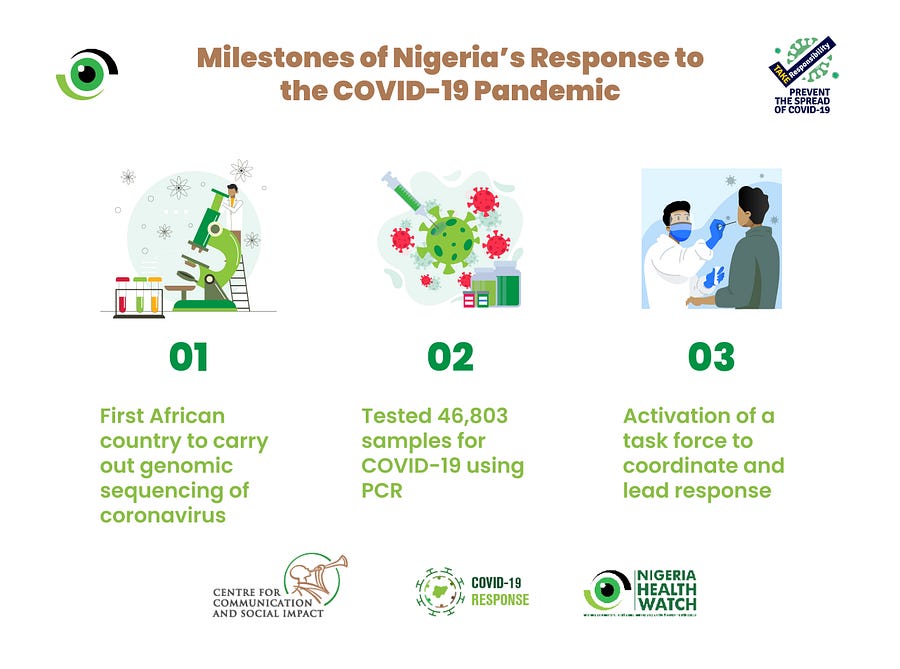
Furthermore, the PTF coordinates material support from the private sector to the government. The task force recently received a donation of a 300-bed capacity isolation center at the ThisDay Dome donated by Sahara Energy Group and ThisDay Media to assist in the management of confirmed COVID-19 cases. With support from the United Nations (UN) country office, the presidency also set up a COVID-19 basket fund to mobilise resources from various stakeholders for effective response to the pandemic. To better mobilise financial support from businesses, humanitarian organisations and individuals, the President also approved the restructure of the Treasury Single Account (TSA). The Minister of Finance, Budget & National Planning, Zainab Shamsuna Ahmed, said the restructuring involved creating flexibility and building coalitions with banks, while maintaining the sanctity of the TSA.
The PTF has functional similarities with the United States’ Corona Virus Task Force, chaired by Vice President Mike Pence, and is the link between the Nigerian presidency and various MDAs, states and citizens in the fight against COVID-19. The PTF is valuable in providing policy direction for this fight. They have been able to provide specific guidelines to various agencies and have facilitated interactions with the international community on Nigeria’s behalf.
Responding to the COVID-19 Pandemic: The Federal Ministry of Health
The COVID-19 pandemic is a public health emergency, therefore, the public health response to the outbreak rests with the Federal Ministry of Health (FMOH) under the leadership of Dr Osagie Ehanire. However, the COVID-19 response has also required a multi-stakeholder, multi-agency collaboration as other relevant MDAs have been incorporated in to contribute their expertise to the response. The FMOH activated a National Emergency Operations Centre (EOC) for COVID-19, which is domiciled at the NCDC. The EOC is leading the national public health response to the COVID-19 outbreak in Nigeria, and is made up of different teams (pillars) responsible for different areas of the response, such as risk, communication, infection prevention and control and case management, with state EOCs leading the response at the state level. The FMOH through the NCDC has led the risk communications, producing health promotion materials in different languages targeting various groups including religious and traditional leaders, as well as self-isolation guidelines for males and females.
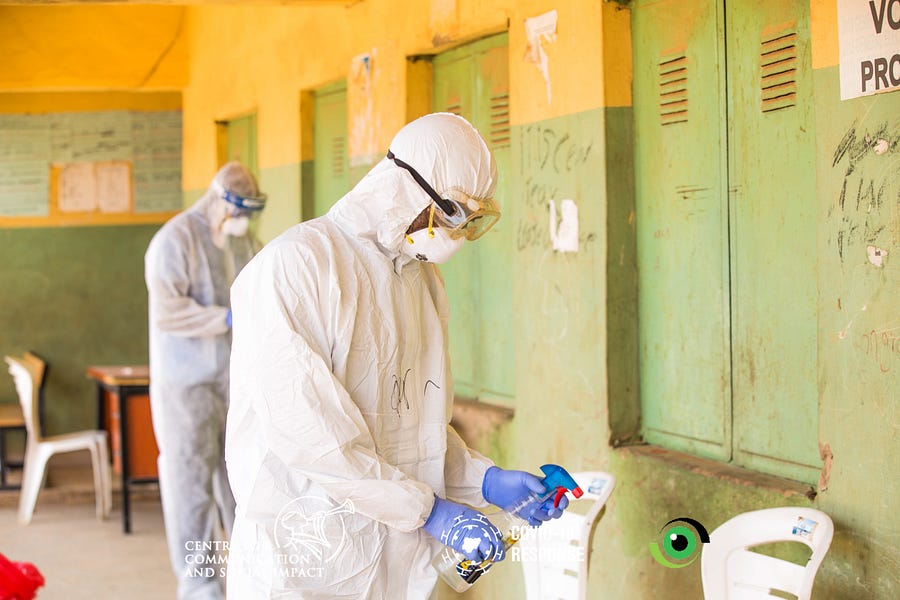
The Nigeria Centre for Disease Control (NCDC) is the Federal Ministry of Health (FMoH) agency tasked with responding to infectious disease outbreaks. Other agencies of the FMoH such as the National Institute for Medical Research (NIMR), National Institute for Pharmaceutical Research and Development (NIPRD), and National Agency for Food, Drug Administration and Control (NAFDAC) are also integral parts of the COVID-19 national response by developing and expediting processes for testing and validation of claims of pharmaceutical interventions for COVID-19. The National Primary Health Care Development Agency (NPHCDA) is also providing training and guidance to primary health care teams to ensure continuous provision of services by PHCs in communities during the pandemic.
Testing, Training, Protocols and Surveillance: The Nigeria Centre for Disease Control
The mandate of the NCDC is to prevent, detect and respond to threat of infectious diseases in the country. The agency had over the last few years, built systems and structures to help them to effectively carry out their duties.
Expanding COVID-19 Testing Capacity
One of the first things the NCDC did even before the first case was training staff on molecular diagnostic capacities. This happened with support from Africa Centre for Disease Control in Dakar. This was followed by setting up of Emergency Operation Centre and network of molecular diagnostic laboratories across Nigeria to increase the capacity for diagnosing COVID-19. The Director of the National Public Health Reference Laboratory in the Federal Capital Territory (FCT) noted in an interview with Nigeria Health Watch that having established molecular diagnostic capacity was instrumental in being able to quickly develop the capacity to diagnose COVID-19. Since February 2020, Nigeria has significantly increased its molecular laboratory network for COVID-19 testing, from two as at February 27 to 28 fully functional laboratories in states across the country. The collaboration between NCDC and state governments, as well as private sector partners such as 54Gene, EHealth Africa, Shell Petroleum and Development Company of Nigeria (SPDC) and Dangote Foundation, amongst other partners, was instrumental to the expansion of the COVID-19 testing capacity.
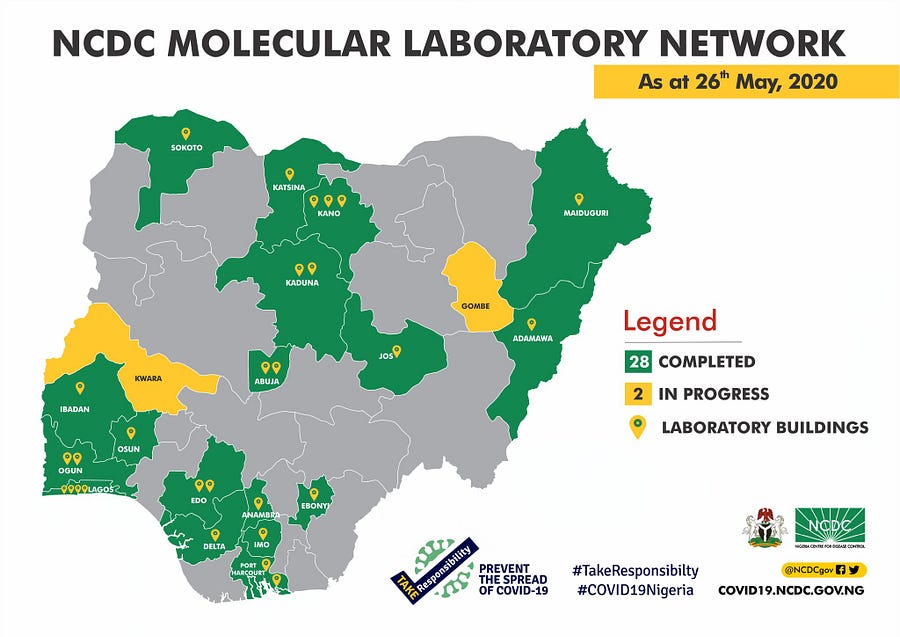
This resulted in better coordination that enabled better collection and a better, faster testing process. In addition to the samples being collected from people who meet the case definition, active case finding was implemented in communities to identify potential asymptomatic transmitters.
Facilitating Training
The NCDC aggressively improved staff capacity in advanced diagnostics, disease surveillance and response. They also supported states to train public health workers, set up systems for efficient epidemiological data collection and sharing and established Emergency Operations Centres (EOCs) for effective coordination of the response to infectious disease outbreaks. The NCDC is also training health workers on infection prevention and control protocols, sample collection and effective management of COVID-19 patients. These trainings happen both in-person and virtually. In addition to training community groups such as religious and traditional leaders on risk communication in communities across the country, the NCDC risk communications teams also conducted training for military and paramilitary personnel, which will go a long way in making sure people know how to protect themselves, families and colleagues from the disease. These training helped increase the capacity of health professionals to detect COVID019, as well as increased awareness and compliance with the NCDC’s #TakeResponsibility Campaign amongst various groups. Rapid case detection played an important role in the early identification and diagnosis of the index case.

Developing public health protocols
Long before the first case was confirmed in Nigeria, the NCDC established public health protocols with other agencies like the Ministry of Aviation, Nigeria Immigration Service, Nigeria Port Health Services, Nigerians in Diaspora Commission and Foreign Affairs. These protocols included mandatory completion of forms by travelers coming into the country to track their travel history. Travelers were also made to undergo temperature checks at airports before proceeding into the country. The systems already in place made it possible to trace passengers who had arrived on the same flight with the index case, despite the challenges, including people supplying incorrect contact information.
The guideline developed by the NCDC which involves definition of probable, suspected and confirmed cases as well as symptomatic treatment and managing underlying illnesses has guided patient management at hospitals and isolation facilities in the country. Before being certified COVID-19 free and being discharged, patients on treatment must have two tests within 24 hours that return a negative result for them to be considered COVID-19 negative. In order to limit the spread of the disease, the NCDC produced guidelines on public gatherings, management of pregnant women, the use of public transport, social distancing and wearing of non-medical face coverings, as well as guidelines for the safe burial of individuals who die from COVID-19.
Communication for public engagement and surveillance
The NCDC is also coordinating surveillance for the disease, supporting states to carry out contact tracing, collecting and testing samples from suspected cases, and supporting the establishment and accreditation of isolation and treatment centres.
Communication plays a significant role in COVID-19 surveillance by monitoring general conversations and engaging with the public. This is referred to as Event Based Surveillance and made possible by the NCDC Connect Centre. The centre manages the NCDC toll-free line, WhatsApp and SMS platforms.
As part of its risk communications activities, the NCDC in collaboration with other organisations has produced and shared multimedia content, including videos, infographics, and audio jingles, in various languages, targeting different demographics. This has helped increase awareness about COVID-19 and enlightened many Nigerians on how to protect themselves and stay safe. Beyond providing quality information, the communication efforts have actively addressed misinformation and fake news which has been very common since the outbreak started. These efforts have largely leveraged on technology, including automated WhatsApp messages, a dedicated website, and regular online live sessions, with support from social media platforms and Nigerian telecommunication companies sending public health messages to their customers.
The NCDC risk communications pillar has also distributed messages to media platforms across the country and commenced training of journalists and media houses on understanding the technicalities behind reporting on COVID-19.
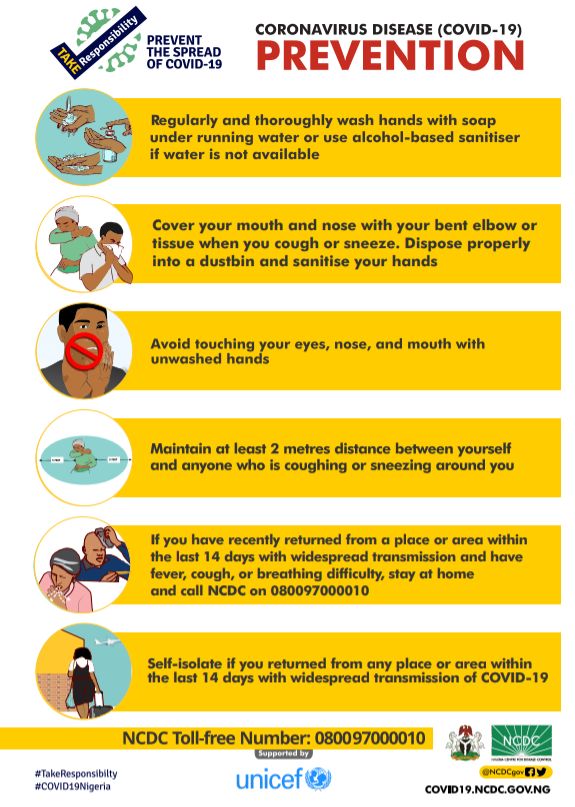
Supporting Compliance to COVID-19 Advisory: Security Agencies
As an integral part of the multi sector response, security agencies are also playing a critical role in maintaining law and order and ensuring people adhere as much as possible to public health guidelines. With lockdowns imposed in several states across the country and interstate travels banned, security agencies, especially the police have their hands full in ensuring that the law is obeyed. All over the country, on highways and intracity roads, checkpoints have been setup to ensure compliance.
Other agencies like the Federal Road Safety Corps (FRSC) and Nigeria Security and Civil Defense Corps (NSCDC) have also supported the police in ensuring compliance. The Nigeria Immigration Service has restricted entrance into the country through Nigeria’s land borders, in order to limit cross country transmission of the disease. This has been effective in most cases with interstate travels greatly reduced to minimise community transmission. However, there are still pockets of cases where people have found their ways from one state to other states and this has the potential to undermine control efforts.

The next 90 days
A lot has changed since the early days of the response. In the general population, awareness of the virus has increased from 84% to 99% between March 18 and April 14. Another example is how NCDC has adapted when it comes to handling communication by encouraging citizens to call their state helplines first, as opposed to the early days of the outbreak when the focus was on calling the NCDC helpline for even basic inquiries. The NCDC also listened to requests to openly publish data on the total number of tests conducted. As the outbreak evolves adaptation will continue to be a key factor in this response.
There are opportunities to improve as life gradually adapts to our “new normal”, with the easing of the lockdown. The PTF in some of their daily briefings has encouraged states to take more ownership of the response. They can do this in the areas of active case search and testing, because, if this is not done, NCDC’s expansion of testing capacity for COVID-19 will not be maximised. It is important for every state to take responsibility, especially in the area of actively searching and testing cases to help guide their response.
Also, the Nigerian government must build more trust and cooperation from the citizens, by being more open and transparent with data, especially in the areas of procurement. It is understandable that decisions must be made on the go but making data openly available and accessible will improve transparency and accountability in the response process. There are some examples of this, such as Colombia’s National Health Institute. The organisation awards contracts directly, but also discloses tender data, information and all the technical comments received from potential suppliers for their COVID-19 test and lab supplies procurement.
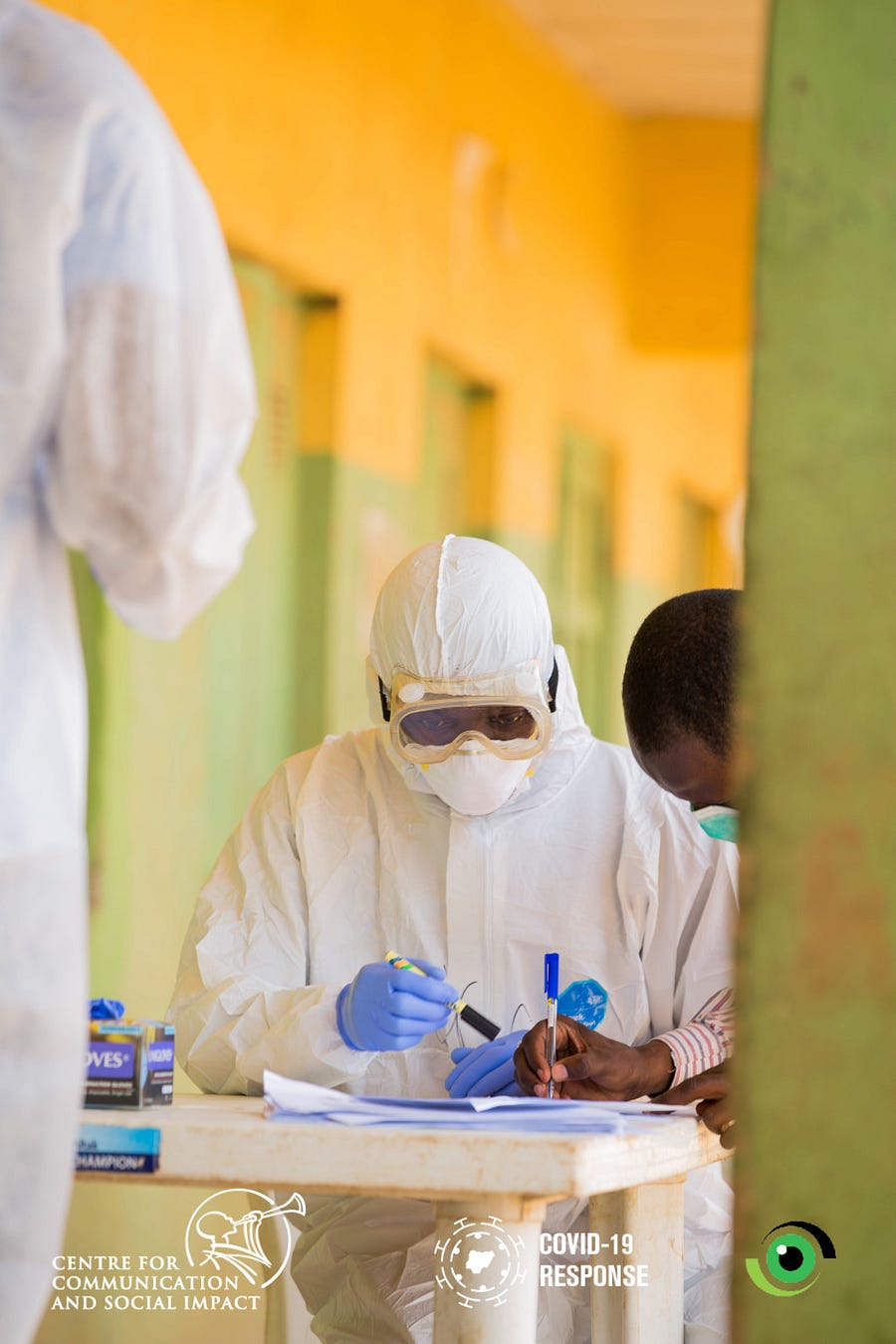
A lot has been learnt in the first 90 days of the response that continues to inform the way strategies and policies are adjusted, in order to mount an effective response against the COVID-19 pandemic. As the government adapts to the COVID-19 pandemic, it is equally important for Nigerians to take responsibility by conforming to these new realities in order to contribute to the effectiveness of the response. Through a joint effort between the leadership and Nigerian citizens, aimed at flattening the curve, there is the need to limit the number of serious cases of COVID-19 that would require intensive care treatment in hospitals. Lagos State has continued to experience a growing number of confirmed cases and is facing the challenge of finding beds in the state’s existing isolation centres. This will require a revision of some of the existing NCDC guidelines in order to better triage confirmed cases, from those who have mild symptoms to the more serious cases.
This documentation project is a collaboration between Nigeria Health Watch (NHW) and the Centre for Communication and Social Impact (CCSI). Follow the conversation online with the hashtag #COVID19NaijaResponse.


